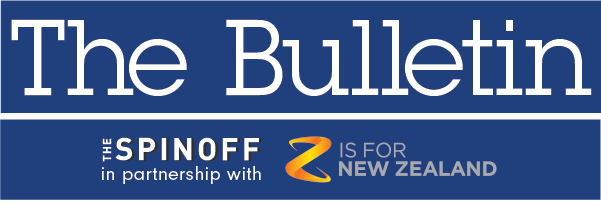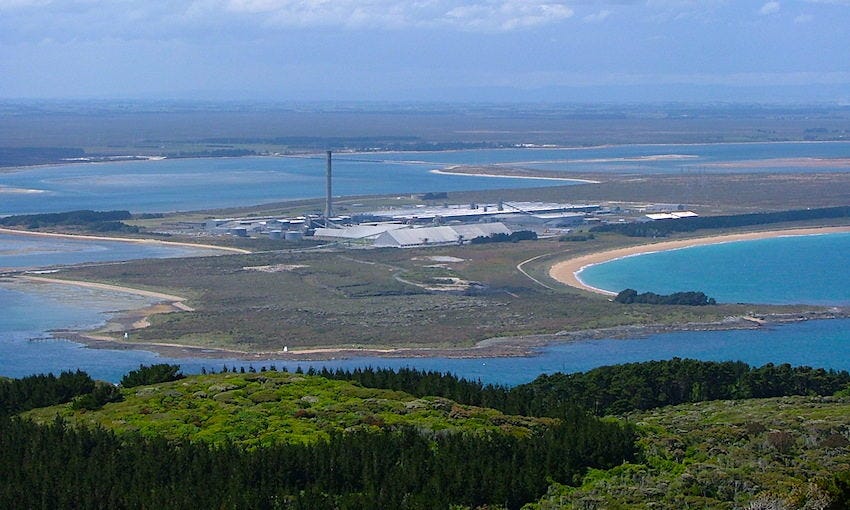ETS and the accounting of emissions
The complexity can obscure a much more simple picture about our climate change failures

Good morning and welcome to The Bulletin for Tuesday 18 February, by Alex Braae for The Spinoff. Presented in partnership with Z Energy.
In today’s edition: Creative accounting around the ETS explored, Ardern goes to ground on Peters, and ACT criticised for keeping donation from extremist.

Image: Tiwai Point Aluminium Smelter, Southland. (Photo: Creative Commons)
Often when reporting on technical and thorny pieces of legislation, it helps to have a specialist reporter looking into it. Stuff's Charlie Mitchell has come out with just such a story, which brings into question a major aspect of the Emissions Trading Scheme, which aims to reduce greenhouse gas emissions by requiring polluters to purchase carbon credits from offsetting schemes – generally forests. And amid wider changes, Mitchell has drilled into a specific and very contentious issue – that major emitters "are likely being over-compensated with taxpayer-funded carbon credits."
They're known as 'Emissions Intensive, Trade Exposed' (EITE) firms, as they're vulnerable to overseas competition. It came as a surprise to those organisations, who operate facilities like the Glenbrook Steel mill, the Marsden Point oil refinery, and the Tiwai Point smelter. Mitchell followed up with this story from Parliamentary Commissioner for the Environment Simon Upton, who called upon the government to ignore what was described as "special pleading" from such firms. "Free allocation… Should be about protecting the environment. This is not what New Zealand's current free allocation system does." Effectively, he was arguing for consistency, or else climate targets wouldn't be met.
However, it is inevitable that almost every sector will point to a reason why they should win concessions. A version of this can be seen in this Rural News Group editorial, which called on the government to look more into the socio-economic case around exemptions for farming. They were particularly concerned about a removal on the price cap of carbon, which could dramatically increase the value of forestry relative to farmland, so with farms being replaced it could have wider knock-on effects. You might recall last year the farming industry got a good deal from the government to keep it out of the ETS for now.
And underpinning all this is the simple fact that emissions are still going up. They just are, there's no getting around it, nor is there any point in trying to negotiate with the laws of physics about what an increase of carbon in the atmosphere will mean. And perhaps the example laid bare by Mitchell is fitting, because it's an excellent case study of a wider trend in how the fight against climate change gets undone by exceptions and creative accounting. That's the theme of this scorching op-ed about the Emissions Trading Scheme from Greenpeace boss Russel Norman, who notes that in real terms, under the Paris Agreement New Zealand is effectively pledging to raise emissions against 2005 levels, and we're still not even on track to come in under that target.
A brief message from Toby Morris, editorial cartoonist and illustrator at The Spinoff
I don't think there's anywhere apart from The Spinoff that gets what I'm trying to do and would support it in quite the same way. Similarly – as readers you get to make that choice now too. You choose to read The Spinoff, and by becoming a member you can directly support the kind of stories you want to read more of (and, for $8 a month, get a tea towel!). You support us making something new and different – and, hopefully better, you get to read it.
Another day, another round of distancing and deflection from the PM on the conduct of her coalition partner. I recapped the morning of interviews of PM Jacinda Ardern being asked about NZ First Foundation donations and Winston Peters, and at her post-cabinet (scroll down for video) press conference Jacinda Ardern made it clear that she didn't consider them to be matters worth discussing at cabinet.
ACT leader David Seymour has been criticised for refusing to return a donation from a man who threatened to "destroy mosque after mosque", reports Newsroom's Marc Daalder. Activists have accused Seymour of legitimising such far-right extremists by accepting the money, and say that he should either return it to the donor, or pass it on to an anti-racism organisation. Seymour had previously signed a Make Ardern Go Away hat for the man to auction, and did not provide quotes for Newsroom's most recent story. However, last year he did say "you are trying to conflate something perfectly innocent - auctioning off an amusing hat - with somebody who made some distasteful comments later and there's no connection."
Keep an eye out for news on this potential asset seizure case this week. The NZ Herald's (paywalled) David Fisher has profiled the family behind a fuel recovery company, which stands to lose millions of dollars worth of assets over serious and repeated Health and Safety breaches, which cost the life of a worker. The laws in question are normally used to grab the assets of drug dealers and the like, but in this instance there's an interesting principle to be tested on how broadly the principles of the law can be applied – particularly if unlawful activity was an integral part of what made the company profitable.
National haven't actually released the details of the tax cut pledge they'll take into the election, so my apologies for previewing that early. The NZ Herald's Derek Cheng has a report on what was in the speech from Simon Bridges, in which it was made clear that the party will offer some form of tax relief, to use the party's term. There were a range of other goals, mainly around economic growth. One line in particular from the speech was worth a bit more scrutiny – “People on the average wage shouldn’t be paying almost 33 per cent in the dollar.” I tested that claim out here.
An update into the SFO investigation into donations made to the National Party, from Newsroom's Tim Murphy. He reports that the prosecution of four people is actually over two different donations, both around $100,000, and made in 2017 and 2018 respectively. Interim name suppression continues around the case, but just to reiterate from previous times this story has been mentioned – Simon Bridges maintains that neither he nor the party are among those charged.
Napier's Mayor is criticising the knee-jerk reaction of blaming gangs for an altercation over the weekend. Kirsten Wise told Newshub that actually, the high-profile brawl wasn't gang related, even though many immediately ascribed that motive to it. It contradicted an earlier police statement that everyone involved was in a gang, with Wise saying in fact only one gang member was present. It's one of those things – even if you agree with the view that gangs are a malign and negative presence in the country, it still pays to be fair and accurate.
An $11 million boost will be given to Tourism NZ to explore market diversification, in the wake of the coronavirus. Radio NZ reports places like Rotorua, who generally do really well out of the Chinese tourist market, have been hit hard. Some money will also go towards promoting regional destinations to the domestic tourist market. As someone who has been lucky enough to travel all over New Zealand for both work and holidays, I think it's brilliant, and wholeheartedly endorse the idea that people should go out and see things closer to home.
An update to the housekeeping: Ignore what was said yesterday about this week's Bulletin World Weekly – it will actually be coming out after all despite me being on leave. Stepping into the breach will be The Spinoff's deputy editor Catherine McGregor, just to continue the theme of an all-star team doing the various Bulletins over the next week. A reminder – the Bulletin World Weekly is a world news digest exclusively for Spinoff members.
Got some feedback about The Bulletin, or anything in the news?
Drop us a line at thebulletin@thespinoff.co.nz

Right now on The Spinoff: Sam Brooks goes into the manly masculine world of Meatstock. Jihee Junn interviews the co-founder of Stasher, an 'AirBnb for luggage' app that has recently launched in New Zealand. Jordan Hamel speaks to Kevin Parker, the lead singer of Tame Impala, about a new album and taking time away from the hype. And Hinemoa Elder writes about the many biases and prejudices that still exist in the world of science.
In the fight against climate change, it isn't necessarily just about planting lots of trees. As this long-read from the BBC shows, massive thickets of shrubs could also have a really positive effect, both on the global climate and in creating a local microclimate. The example picked out follows some drought-stricken winemakers in South Africa, who a few years ago realised big changes needed to be made. Here's an excerpt:
“We decided we needed to do something,” she says. That “something” has taken the form of planting one million cuttings of Portulacaria afra over the next five years. This succulent shrub, more commonly known as spekboom, has small, round leaves and is indigenous to the area. When these plants have reached maturity in more than a decade’s time, they’ll be up to 5m (16.4ft) high – more than twice the height of a tall adult. They will cast pools of cooling shadow in spite of the dry heat typical of this landscape. The ground surrounding them will be covered with leaf litter – discarded remnants of their tiny bright leaves – as well smaller shrubs that can flourish in their shade.
The reason for Nel’s enthusiasm and that of many growers in the region is that this humble, hardy, semi-desert plant has the potential to alter both the weather, by bringing rain, and the climate, by absorbing carbon dioxide.
A remarkable and controversial result in a sport that is huge overseas but quite obscure here: Pakistan have beaten India to claim the Kabaddi World Cup, reports AFP, for a title that carries huge prestige in Asia. What makes the result even more interesting is that there's currently a general freeze on sporting contacts between the two nations, and India's sports minister has said there will be an investigation into why Indian players were allowed to play under their flag without permission. The Hindustan Times has more detail on that latter point – you might note that in the first paragraph they say Pakistan beat 'a team from India', rather than simply India.
That's it for The Bulletin. If you want to support the work we do at The Spinoff, please check out our membership programme.




